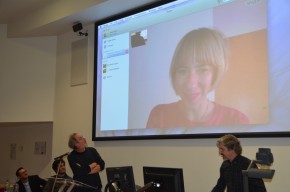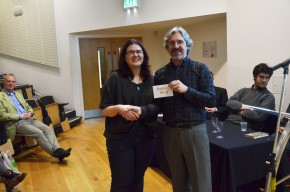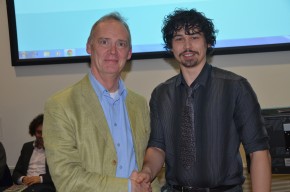A sitcom based around conversations with voice-activated app Siri, a multi-media project on gang warfare in El Salvador and an interactive poetry website were named winners at the New Media Writing Awards.
The international competition, run by Bournemouth University’s Media School, showcases innovative story-telling designed to be accessed through new media devices.
The winners were announced at an awards ceremony at Bournemouth University, with prizes awarded to an overall winner, a people’s choice winner decided by an online public vote, and a student winner.
Esmeralda Kosmatopoulos was named overall winner, receiving a prize of £1,000.
Her entry, Siri and Me, consisted of a virtual sitcom made up of conversations between her and the voice-activated phone application.

Esmeralda Kosmatopoulos receiving the New Media Writing Prize award via Skype, for her virtual sitcom Siri and Me
Esmeralda, who lives in New York, received her award over Skype, saying: “I’m really excited and happy,”
“The way Siri talks to me now may be the way my fridge will start talking to me in the future. You will start to have relationships with your appliances.”
The student prize was won by David Devanny from Falmouth University, for his project Orange Sweatshirt.
His interactive site generates poems, which readers can then alter by changing words, the tone, and format used.
David, whose prize was a three-month paid internship with e-learning company Unicorn Training said: “It’s amazing. The whole thing has been a very good experience, and I’m very shocked and surprised.
“I like the idea of giving over control to the reader as much as possible, so I try to make a point of doing that in my work.”
The winners were decided by a panel of judges which included Dan Franklin, Digital Publisher at Random House; Chris Meade, founder of if:Book UK, which explores the future of books; and Joanna Ellis, Associate Director of The Literary Platform.
Chris Meade said: “What I love about this competition, and this year more than ever, is it’s about a new kind of writer. They are creating things for different platforms and not just writing for a book.”
There was also a People’s Choice Award, decided by an online public vote, with a prize of £250.

Ann Luce, one of the creators of People’s Choice award winner The Engineer, with event organiser Jim Pope.
Over 1,000 votes were received and the award was won by Mathew Charles, Juan Passarelli and Ann Luce for their multi-media project The Engineer, which follows El Salvador’s only forensic pathologist and looks at gang crime in the country.
As well as the winners being announced, the awards ceremony also featured talks from leading new media figures, including Rob Sherman, author of Random House’s first fully interactive fiction Black Crown, and Julian McCrae, creator of multi-media thriller The Craftsman.
They spoke about their work and gave tips for students in the audience who wanted to go into digital storytelling, including quickly making the reader care about your piece and characters, and knowing the genre and audience expectations.
Andy Campbell, who has created Dreaming Methods – a digital scrapbook for authors featuring animation and visual imagery alongside written pieces – also spoke at the awards ceremony.
He said: “It is really a fantastic event and a great showcase for this type of work.
“It’s a nice chance to hopefully influence some up-and-coming writers and encourage people to give it a go.”
The New Media Writing Prize is now in its fourth year and organiser and judge Jim Pope said it was bigger and better than ever.
“I think it has been the most successful awards ceremony we have run, the biggest and most varied range of entries and audience,” said Jim, who is also Course Leader for BA (Hons) English at Bournemouth University.
“The quality of the entries was fantastic and it was so hard to choose a winner because they were all so different, it was like choosing between chalk and cheese.”
 Bournemouth University
Bournemouth University